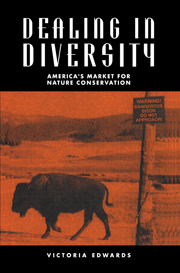Book contents
- Frontmatter
- Contents
- Preface
- Acknowledgments
- 1 Introduction: private provision of conservation
- 2 The conservation market
- 3 Collective action
- 4 Protection mechanisms and incentives
- 5 Fee-hunting
- 6 Watchable wildlife
- 7 Turning development into conservation
- 8 Conservation partners
- 9 Towards a more holistic approach
- References
- Index
8 - Conservation partners
Published online by Cambridge University Press: 19 January 2010
- Frontmatter
- Contents
- Preface
- Acknowledgments
- 1 Introduction: private provision of conservation
- 2 The conservation market
- 3 Collective action
- 4 Protection mechanisms and incentives
- 5 Fee-hunting
- 6 Watchable wildlife
- 7 Turning development into conservation
- 8 Conservation partners
- 9 Towards a more holistic approach
- References
- Index
Summary
If the private owner were ecologically minded, he would be proud to be the custodian of a reasonable proportion of such areas, which add diversity and beauty to his farm and to his community.
Aldo Leopold (The Land Ethic.)Conservation partners – imitating the English Estate?
Until now, this book has highlighted the role of conservation organizations in helping landowners to protect natural areas on private land. In most cases, the conservation organization involved supplies the legal mechanism for protection, some funding and, most importantly, a commitment to enforcing the protection of the natural area in perpetuity. In many cases, a conservation organization will approach a landowner because it perceives that protection of an area of land is consistent with its objectives. In other cases, a landowner may approach an organization because he or she would like to protect an area for private use and nonuse benefits.
In cases where the landowner owns the freehold of all of the land requiring protection, a successful agreement may be reached. However, Chapter 1 identified that natural areas must be of a sufficient size to protect a wide variety of wildlife species. In addition, wildlife tend not to recognize private property boundaries: the policy concerning wildlife on one parcel of land (including managing habitat and the hunting of wildlife) may affect the amount and quality of wildlife present on another. There are benefits to be enjoyed where a landowner welcomes the wildlife onto his or her land.
- Type
- Chapter
- Information
- Dealing in DiversityAmerica's Market for Nature Conservation, pp. 140 - 154Publisher: Cambridge University PressPrint publication year: 1995



